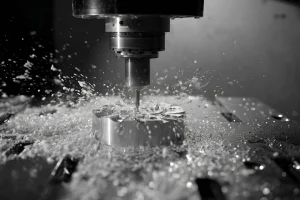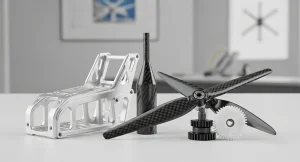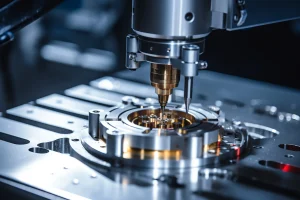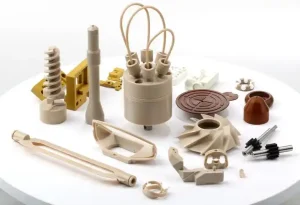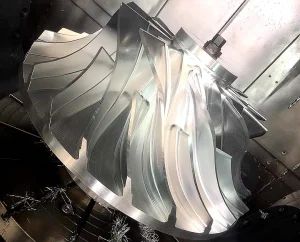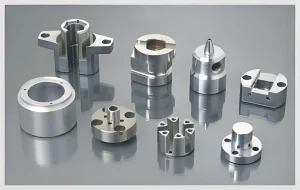1、Introduction
1. Definition and importance of these manufacturers in the industry.
Aluminum alloy precision die casting manufacturers are specialized in producing aluminum alloy products through the precision die casting process. Aluminum alloys, which are combinations of aluminum with elements like copper, magnesium, manganese, silicon, tin, and zinc, possess unique properties such as being lightweight and having good corrosion resistance.
These manufacturers play a crucial role in the industry. They can create complex and high-quality components with tight tolerances, which are widely used in various fields. For example, in the automotive industry, precision die cast aluminum alloy parts can be found in engine components, transmission parts, and chassis elements, helping to reduce the overall weight of vehicles and improve fuel efficiency. In the electronics industry, they are used to make casings for smartphones, laptops, and other devices, providing both good protection and a stylish appearance. Moreover, in the aerospace industry, precision die cast aluminum alloy parts contribute to the construction of aircraft, as they meet the requirements of strength and light weight at the same time.
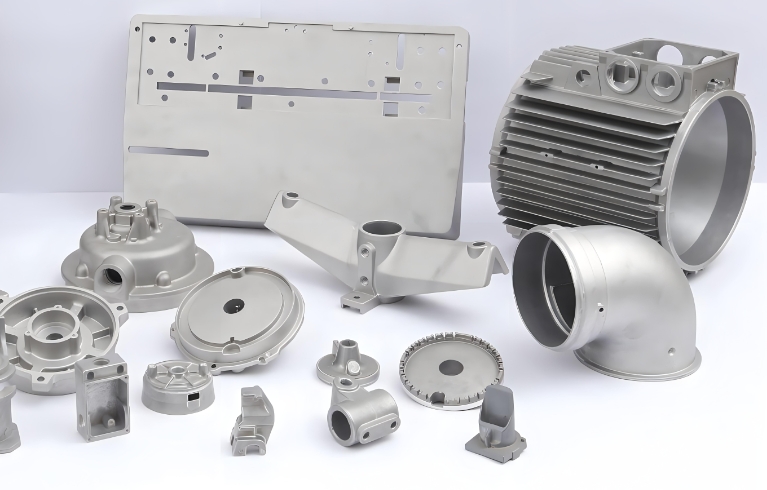
2. Why choosing the right one matters. Impact on product quality and business success.
Selecting the appropriate aluminum alloy precision die casting manufacturer has a significant impact on product quality. A reliable manufacturer will have advanced die casting equipment and precise control over the casting process parameters like temperature, pressure, and injection speed. This ensures that the produced parts have consistent dimensions, smooth surfaces, and no internal defects such as porosity or cracks. High-quality products will not only perform well in their intended applications but also have a longer service life.
From a business perspective, partnering with the right manufacturer can lead to business success. If the manufacturer can deliver products on time and with good quality, it helps to maintain a good reputation among customers. For instance, a company that relies on aluminum alloy die cast parts for its final products can avoid production delays and customer complaints by choosing a manufacturer with a high level of efficiency and reliability. On the contrary, if a manufacturer fails to meet the quality standards, it may result in increased costs for rework or replacement of defective parts, and even damage the brand image of the business. In the highly competitive market, the choice of a good aluminum alloy precision die casting manufacturer can truly be a key factor for a company’s growth and prosperity.
2、Factors to Consider
Quality Assurance
- Certifications and standards. When choosing aluminum alloy precision die casting manufacturers, it’s vital to check their certifications and adherence to industry standards. For example, ISO 9001 certification indicates that the manufacturer has a well-established quality management system in place. It ensures that the production process, from raw material selection to the final product inspection, follows strict guidelines. Manufacturers with relevant certifications are more likely to produce consistent and high-quality die cast parts. Also, compliance with standards like ASTM (American Society for Testing and Materials) for aluminum alloys shows that their materials meet specific mechanical and chemical property requirements, which is crucial for the performance of the final products.
- Quality control processes. A reliable manufacturer will have comprehensive quality control processes. They should conduct regular inspections at different stages of production. For instance, before the die casting process begins, they check the quality of the aluminum alloy raw materials to make sure there are no impurities or defects. During the casting process, parameters such as temperature, pressure, and injection speed are closely monitored to avoid issues like porosity or incomplete filling of the mold. After casting, thorough inspections including visual checks, dimensional measurements, and non-destructive testing (like X-ray inspection in some cases) are carried out to ensure that the parts meet the required tolerances and quality standards.
Production Capacity
- Size of the manufacturing facility. The size of the manufacturing facility can give you an idea of the manufacturer’s production potential. A larger facility usually means they have more space for equipment, storage of raw materials and finished products, and can accommodate multiple production lines. For example, a big facility might be able to handle large orders more efficiently and have better flexibility in scheduling production runs. It also indicates that they may have the resources to invest in advanced machinery and expand their operations in the future.
- Volume of production capabilities. Understanding the manufacturer’s production volume capabilities is essential, especially if you have specific quantity requirements for your products. Some manufacturers are better suited for small to medium-sized production runs, while others can handle high-volume orders. You need to assess whether they can meet your expected production volume within the required time frame. For instance, if you are in a business that requires a steady supply of a large number of aluminum alloy die cast parts regularly, a manufacturer with high production volume capabilities and efficient production planning will be a better choice to avoid production delays.
Technological Expertise
- Advanced die casting technologies. Look for manufacturers that utilize advanced die casting technologies. Technologies like high-pressure die casting can produce parts with better dimensional accuracy and surface finish. For example, some modern die casting machines are equipped with precise control systems that can adjust the pressure and flow rate of the molten aluminum alloy in real-time, resulting in more consistent and high-quality castings. Manufacturers who keep up with the latest technological advancements are more likely to be able to produce complex and intricate parts that meet the demanding requirements of various industries.
- R & D capabilities. A manufacturer with strong R & D capabilities can be a great asset. They can work on improving existing die casting processes, developing new alloys for specific applications, or creating innovative designs for die cast parts. For instance, if your business needs custom-designed aluminum alloy parts with unique properties or functions, a manufacturer with an active R & D team can collaborate with you to develop and produce such parts. They can also adapt to new market demands and technological changes more quickly, giving you an edge in your industry.
Cost-effectiveness
- Pricing structure. The pricing structure of the manufacturer is an important factor to consider. It’s not just about choosing the cheapest option, but rather finding the best value for your money. Some manufacturers may offer lower prices but compromise on quality or delivery time. You need to analyze their pricing based on factors like the complexity of the parts, the quantity ordered, and any additional services provided (such as finishing or assembly). For example, a manufacturer might offer volume discounts for large orders, which can significantly reduce your overall production cost.
- Value for money. Consider the overall value for money that the manufacturer provides. This includes not only the price of the die cast parts but also the quality, delivery time, and after-sales service. High-quality parts that last longer and perform better can actually save you money in the long run, even if their initial price is slightly higher. On-time delivery is crucial to avoid production disruptions in your own business. And good after-sales service, like being able to handle any quality issues promptly or provide technical support, adds to the overall value you get from partnering with the manufacturer.
Reputation and Reviews
- Customer testimonials. Customer testimonials are a valuable source of information. You can look for reviews and feedback from previous clients of the manufacturer. Positive testimonials about the quality of their products, on-time delivery, and good communication during the production process are signs of a reliable manufacturer. For example, if other businesses in your industry have had a great experience working with a particular die casting manufacturer and have praised their ability to meet tight tolerances and handle custom orders well, it gives you more confidence in choosing them.
- Industry reputation. The manufacturer’s reputation within the industry also matters. A manufacturer that is well-known and respected in the aluminum alloy precision die casting field is more likely to have a good track record. They may be involved in industry associations, participate in trade shows, and have a good relationship with suppliers and other partners. An established reputation indicates that they have consistently met industry standards and customer expectations over time, which can give you peace of mind when entrusting them with your die casting projects.
3、Evaluating Manufacturers
What to look for during a visit.
When you visit an aluminum alloy precision die casting manufacturer’s facility, there are several key aspects to focus on. Firstly, check the overall cleanliness and organization of the workspace. A clean and well-organized factory often indicates a good management system and attention to detail, which can be reflected in the quality of the products. For example, if the production area is cluttered with debris or unused materials, it might suggest that there could be issues with the handling of raw materials or finished products, potentially leading to damage or contamination.
Secondly, examine the condition of the equipment. Look for signs of regular maintenance, such as clean machinery surfaces, properly lubricated parts, and up-to-date inspection tags. Well-maintained equipment is more likely to produce consistent and accurate die castings. You can also ask about the age and model of the die casting machines. Newer models usually come with advanced features that can improve the quality and efficiency of production, like better control over casting parameters.
Another important point is to observe the safety measures in place. Adequate safety equipment for workers, clear safety signage, and proper ventilation systems are all signs of a responsible manufacturer. A safe working environment not only protects the employees but also helps to ensure the smooth running of the production process without unexpected disruptions due to accidents.
Observing production processes.
During your visit, closely observe the production processes in action. Pay attention to how the aluminum alloy raw materials are prepared before casting. Are they properly melted and refined to remove impurities? For instance, if the melting process is not carefully controlled, it can result in inconsistent alloy compositions and affect the mechanical properties of the final products.
Watch the die casting operation itself. Check if the operators are following standardized procedures when injecting the molten aluminum into the molds. The injection speed, pressure, and temperature should be precisely controlled according to the specific requirements of the parts being produced. Any deviations in these parameters can lead to defects like porosity, incomplete filling of the mold, or surface imperfections.
Also, look at the post-casting processes such as trimming, finishing, and quality inspection. How are the excess materials removed? Are the finishing operations carried out carefully to achieve the desired surface smoothness? And most importantly, how thorough is the quality inspection? Does the manufacturer use advanced inspection techniques like X-ray or ultrasonic testing to detect internal defects that may not be visible to the naked eye? A comprehensive quality inspection process is crucial for ensuring that only high-quality die cast parts leave the factory.
Importance of evaluating samples.
Requesting and evaluating samples from potential aluminum alloy precision die casting manufacturers is of great importance. Samples can provide you with tangible evidence of the manufacturer’s capabilities and the quality of their products. By examining the samples, you can directly assess whether they meet your specific requirements in terms of dimensions, surface finish, and mechanical properties. For example, if you need die cast parts for an electronic device casing that requires a high level of precision and a smooth surface to give a good aesthetic look, the sample will show you if the manufacturer can achieve this.
Moreover, samples allow you to test the parts in a real or simulated application environment before making a large order. This can help you identify any potential issues early on, such as whether the parts fit together properly if they are part of an assembly or if they can withstand the expected mechanical stresses in actual use. It’s much better to discover these problems with a sample rather than after receiving a batch of products that don’t meet your expectations.
Quality assessment of samples.
When assessing the quality of samples, start with visual inspection. Check for any visible defects on the surface, such as scratches, pits, or burrs. A smooth and defect-free surface is usually an indicator of good casting and finishing processes. Then, measure the dimensions of the sample using appropriate measuring tools like calipers or micrometers to ensure that they are within the specified tolerances. Any significant deviation from the required dimensions can cause problems when integrating the parts into your final product.
Next, you can conduct some basic mechanical property tests if possible. For example, you might test the hardness of the sample to see if it meets the expected standards for the particular aluminum alloy used. You can also perform simple strength tests to assess its durability. Additionally, if relevant to your application, check for features like the corrosion resistance of the sample. This could involve exposing it to a simulated corrosive environment and observing any signs of deterioration over time. By thoroughly evaluating these aspects of the samples, you can make a more informed decision about whether the manufacturer is capable of producing the high-quality die cast parts you need.
Communication and Responsiveness
Timely responses.
Timely responses from the aluminum alloy precision die casting manufacturer are essential throughout the entire process of collaboration. When you first inquire about their services, a prompt reply shows their professionalism and interest in working with you. They should be able to answer your initial questions regarding their production capabilities, pricing, lead times, and any other concerns you may have in a timely manner. For example, if you send an email asking for a quote and it takes them several days or even weeks to respond, it might indicate that they have poor internal communication or are not efficient in handling customer inquiries.
During the production process as well, timely communication is crucial. If there are any issues or changes in your order requirements, such as a modification in the design of the die cast parts or a change in the delivery schedule, the manufacturer should respond quickly and work with you to find solutions. Delayed responses can lead to production delays and potential disruptions to your own business operations. A manufacturer that values good communication will keep you updated regularly on the progress of your order, from the start of production to the final shipment.
Clear communication channels.
Clear communication channels need to be established between you and the manufacturer. There should be multiple ways to contact them, such as by phone, email, or even instant messaging platforms if applicable. This ensures that you can reach them easily whenever you have questions or need to convey important information. For instance, if you discover a problem with a sample and want to discuss it with their technical team immediately, having a direct phone line to the relevant person can save a lot of time and avoid misunderstandings.
Moreover, the manufacturer’s staff should be able to communicate clearly and effectively. Their explanations about technical aspects of the die casting process, quality control measures, or any other details should be easy to understand, especially if you are not an expert in the field. They should also be able to listen carefully to your requirements and concerns and provide accurate feedback. Clear communication helps to build a good working relationship and ensures that both parties are on the same page regarding the production and delivery of the aluminum alloy precision die cast parts.
In conclusion, when choosing aluminum alloy precision die casting manufacturers, thoroughly evaluating these aspects related to site visits, sample requests, and communication and responsiveness can greatly increase the likelihood of partnering with a reliable and high-quality manufacturer that can meet your business needs.
Brief introduction: Tips on choosing aluminum alloy precision die casting manufacturers including site visits, sample evaluation and communication aspects.
Tags: Aluminum alloy precision die casting, Manufacturer selection, Site visits, Sample requests, Communication
4、The Role of Rapidefficient in CNC Machining Market
1. Value of rapidefficient in aluminum alloy precision die casting
Improved efficiency and productivity
Rapidefficient plays a significant role in enhancing the efficiency and productivity of aluminum alloy precision die casting. In the die casting process, its advanced CNC machining techniques allow for quicker setup times. For example, the precise programming enables the machines to start production rapidly once the molds are in place. Unlike traditional methods that might involve time-consuming manual adjustments and calibrations, rapidefficient’s systems can automatically adjust parameters like cutting speeds and feed rates based on the specific requirements of the aluminum alloy die casting parts. This means that more parts can be produced in a shorter period.
Moreover, it minimizes downtime between different production batches. The automated tool change feature, which is often part of rapidefficient’s offerings, ensures that the transition from one type of part production to another is seamless. Workers don’t have to spend a lot of time manually replacing tools, thus saving valuable production time. For instance, in a busy manufacturing facility that produces various aluminum alloy die cast components for different industries, rapidefficient’s ability to quickly switch between tasks can result in a significant increase in the overall output within a day or a week.
Enhanced quality control
When it comes to quality control in aluminum alloy precision die casting, rapidefficient stands out. Its CNC machines are equipped with high-precision sensors that constantly monitor the machining process. During the cutting and shaping of the aluminum alloy, these sensors can detect even the slightest deviations from the set parameters. For example, if there is a variation in the thickness of the part being machined or an incorrect angle is being cut, the sensors will immediately alert the operators or even make automatic adjustments to correct the issue.
This precise monitoring leads to a higher level of consistency in the quality of the die cast parts. The surface finish of the parts produced with rapidefficient’s technology is often smoother compared to those made using less advanced methods. In applications where a high-quality aesthetic appearance is crucial, such as in the production of aluminum alloy casings for electronics or luxury items, this smooth surface finish can be a major advantage. Additionally, the dimensional accuracy achieved through rapidefficient’s CNC machining ensures that the parts fit together perfectly in assemblies, reducing the likelihood of rework or defective products.
2. Case Studies
Real-world examples of successful applications
One notable example of rapidefficient’s successful application in aluminum alloy precision die casting is in a company that specializes in manufacturing automotive components. The company needed to produce a large quantity of aluminum alloy engine parts with tight tolerances. By implementing rapidefficient’s CNC machining solutions, they were able to increase their production output by nearly 30% within the first month. The precise control over the machining process ensured that each part had the exact dimensions required, which was vital for the proper functioning of the engines.
In another case, a manufacturer of aluminum alloy parts for the electronics industry was struggling with quality issues related to surface finish and dimensional accuracy. After adopting rapidefficient’s technology, they saw a remarkable improvement. The sensors on the CNC machines detected and corrected any minor imperfections during the machining process, resulting in a significant reduction in the number of defective parts. This not only saved them the cost of rework but also improved their reputation among customers, leading to increased orders.
Benefits for manufacturers and customers
For manufacturers, the benefits of using rapidefficient in aluminum alloy precision die casting are numerous. Firstly, the increased productivity means they can take on more orders and expand their business. With the ability to produce high-quality parts efficiently, they can also enter new markets and compete with larger players. For example, a small to medium-sized die casting manufacturer can use rapidefficient’s technology to offer the same level of quality as bigger competitors but at a more competitive price due to reduced production costs.
Customers also reap the rewards. They receive aluminum alloy die cast parts that are of consistent quality, which reduces the risk of failures in their final products. For instance, in the aerospace industry, where precision and reliability are of utmost importance, using parts produced with rapidefficient’s CNC machining ensures that the aircraft components meet the strict safety and performance standards. This ultimately leads to safer flights and fewer maintenance issues, benefiting both the airlines and the passengers.
In conclusion, rapidefficient’s role in the CNC machining market for aluminum alloy precision die casting is invaluable. Its ability to boost efficiency, productivity, and quality control makes it an attractive option for manufacturers, while also providing significant benefits to the end customers.
5、Conclusion
1. Summary of key points
In this article, we’ve explored the essential aspects of choosing aluminum alloy precision die casting manufacturers. We started by understanding what these manufacturers are and why choosing the right one is crucial for product quality and business success. We then delved into various factors to consider, such as quality assurance, production capacity, technological expertise, cost-effectiveness, and reputation and reviews.
Evaluating manufacturers through site visits, sample requests, and assessing their communication and responsiveness were also discussed in detail. Additionally, we highlighted the significant value that rapidefficient brings to the table in aluminum alloy precision die casting, including improved efficiency, productivity, and enhanced quality control. Case studies demonstrated its real-world applications and benefits for both manufacturers and customers.
2. Importance of making an informed choice
Making an informed choice when selecting an aluminum alloy precision die casting manufacturer is of utmost importance. The quality of the die cast parts produced by the manufacturer directly impacts the performance and durability of your final products. If you choose a manufacturer without proper quality control measures, it could lead to parts with defects like porosity or incorrect dimensions, which might cause failures in your products and harm your business reputation.
Moreover, considering production capacity ensures that your orders can be fulfilled on time and in the required quantities. Technological expertise allows for the creation of complex and high-quality parts that meet the specific needs of your industry. Cost-effectiveness helps you get the best value for your investment, and a good reputation and reliable communication channels build a smooth and trustworthy partnership. In a competitive market, every decision regarding the choice of a manufacturer can influence your business’s growth and competitiveness.
3. Recommendation of rapidefficient CNC aluminum processing service providers
We highly recommend rapidefficient as a top choice for CNC aluminum processing services in the field of aluminum alloy precision die casting. With its advanced CNC machining techniques, rapidefficient can boost your production efficiency and productivity significantly. Its ability to quickly set up production, minimize downtime between batches, and automatically adjust machining parameters ensures that you can get more high-quality parts in less time.
In terms of quality control, the high-precision sensors on its CNC machines constantly monitor the process and correct any deviations, resulting in die cast parts with excellent surface finish and dimensional accuracy. The real-world case studies we’ve seen showcase how manufacturers have benefited from using rapidefficient’s technology, whether it’s increasing production output or improving product quality. And ultimately, customers also enjoy the advantages of receiving consistent and reliable die cast parts for their applications. So, if you’re looking for a reliable

